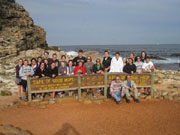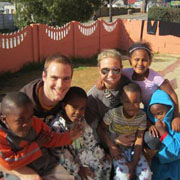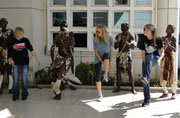VOA标准英语2011--US Students Bond with Locals While Studying Abroad
时间:2019-01-14 作者:英语课 分类:VOA标准英语2011年(十月)
US Students Bond with Locals While Studying Abroad
Each year, about a quarter of a million Americans study abroad. For many of them, a summer or a semester in a foreign country involves more than just sitting in classrooms and hanging out with other American students. Instead, they are required to be involved in the local communities where they are studying.
On his first morning in Beijing, one American study-abroad student was dropped off in a distant part of the Chinese capital with $5 and instructions to find his way back home on his own. It took a while, but he made it.
That’s one example of how American students are being pushed out of their ‘comfort zone’ in order to fully 1 experience another culture.
“It’s absolutely crucial that they know something about how people in other parts of the world live and think and how they behave," says William Finlay, head of the sociology department at the University of Georgia. “Often those students go in large groups. They hang around each other. We felt that they really weren’t getting to know the local inhabitants as well as they could.”

Dr. William Finlay (seated right) on a hike with a study-abroad group in South Africa.
In 2008, he co-founded a study abroad program with South Africa’s Stellenbosch University. It combines traditional academic in-class learning with community involvement. The program partners with a local NGO which runs daycare centers for children of working parents and a library with computers available for patrons to use.
"Our students typically work either with the little kids in the day cares or they work in the library and teach basic computer skills to mostly young adults,” says Finlay.
Having an impact
The three-week program proved to be a transformative experience for Hillary Kinsey.
“It was interesting to learn the history of the area and the recent development with democracy and that sort of thing," she says, "and then talk to these people and see what the social dynamics 2 were, what the ethnic 3 divisions were, how certain groups felt about other groups.”

Study abroad students Ben Valerio and Hillary Kinsey at the Siyazingcy Creche, a daycare center in South Africa.
When the international affairs major returned from South Africa a few weeks ago, she and other students in the program established a non-profit.
“We called it ’Ubuntu,’ which is a South African concept coined by Desmond Toto," she explains. "It means ‘I am, because we are.’ The idea is based around the relationships within the society and what generates prosperity for all. We took that notion and translated it into a larger international community.”
The group hopes to contribute to advancing education and development in South Africa.
“We have a lot of people that did not go to South Africa, but they are interested in this," she says. "And one of the purposes of our organization is that we hope to raise money and awareness 4 for the situation of these people and try to facilitate building daycares there and helping 5 to promote any sort of educational development we could through donations and fundraisers and that sort of thing.”
Intensive approach
While many study abroad programs focus on helping Americans learn foreign languages, others take a more intensive approach.
“In all of our locations, we place students with local roommates," says Mark Lenhart, executive director of CET Academic Programs. The organization sends more than 1,000 students to China, Jordan, the Czech Republic and other countries each year.

Study abroad students (from left) Gina Nuccio, Hillary Kinsey and Alyssa Crosby dance with Zulu musicians and performers wearing traditional tribal 6 clothing.
He says American students benefit from such one-on-one interactions, in spite of the challenges they face.
“Not just in terms of language learning, but they also find the local culture can present challenges, and perhaps misunderstandings," Lenhart says. "They have to adjust to local life. It’s no longer okay just to have a little Chinese, for instance. If the student is studying Chinese, they want to come home from a program like this fluent in Chinese. So this will enable students to become more employable when they graduate.”
Going global
Preparing American students to be more competitive in the global job market is one of the goals of the recent trends in study abroad.
Allen Goodman, president of the Institute of International Education, which promotes educational exchange, says study abroad also prepares young people to become global citizens.
“You really can’t have that global citizen perspective by just reading a book or just connecting to someone who lives in Egypt on the Internet," Goodman says. "You have to go and see the reality of another place. That’s what study abroad promotes.”
He predicts study abroad programs will continue to evolve and attract more students who find it to be a unique and valuable opportunity to learn about themselves and the world in which they live.
- The doctor asked me to breathe in,then to breathe out fully.医生让我先吸气,然后全部呼出。
- They soon became fully integrated into the local community.他们很快就完全融入了当地人的圈子。
- In order to succeed,you must master complicated knowledge of dynamics.要取得胜利,你必须掌握很复杂的动力学知识。
- Dynamics is a discipline that cannot be mastered without extensive practice.动力学是一门不做大量习题就不能掌握的学科。
- This music would sound more ethnic if you played it in steel drums.如果你用钢鼓演奏,这首乐曲将更具民族特色。
- The plan is likely only to aggravate ethnic frictions.这一方案很有可能只会加剧种族冲突。
- There is a general awareness that smoking is harmful.人们普遍认识到吸烟有害健康。
- Environmental awareness has increased over the years.这些年来人们的环境意识增强了。
- The poor children regularly pony up for a second helping of my hamburger. 那些可怜的孩子们总是要求我把我的汉堡包再给他们一份。
- By doing this, they may at times be helping to restore competition. 这样一来, 他在某些时候,有助于竞争的加强。